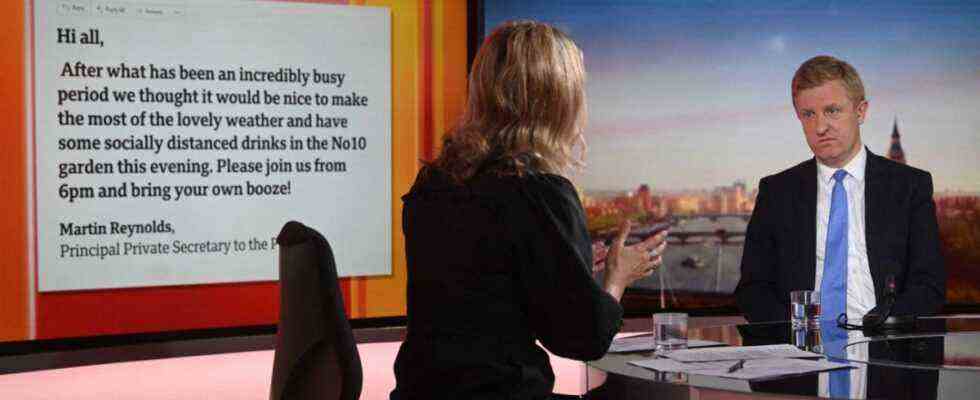The British Broadcasting Corporation has long been a thorn in the side of the Conservative Party in the UK. The BBC is too left-leaning, too big-city elitist and, above all, too expensive. These are the arguments that have been heard from the Tories for decades now, with increasing volume and vigour.
Now the government under Prime Minister Boris Johnson seems to want to take concrete measures to convert – some commentators say: to dismantle – the station: British Minister for Culture, Media and Sport, Nadine Dorries, has announced that the BBC Broadcasting License Fee, which is currently 190 euros per year (i.e. 15.83 euros per month), is to be abolished in 2027. Then the previous funding arrangements for the BBC, which were set by a time-limited Royal Charter, will end. A Royal Charter, a kind of corporate statute, is awarded by the British monarch on proposals from the respective government. In the case of the BBC, in addition to funding, it also defines the broadcaster’s objectives and public role.
In addition, Nadine Dorries only wants to increase the license fee once more and then freeze it at this level for the next two years, which, adjusted for price, is tantamount to a budget cut. That would force the BBC to severely curtail its reporting, increase its reliance on reruns and potentially lay off thousands of staff.
Tories compare BBC reports on party PM to media ‘attempted coup’
It is reasonable to interpret this announcement as a political diversionary tactic at this point in time. Prime Minister Boris Johnson – whose long-lasting popularity has not least been witty performances on BBC shows such as Have I Got News For You owes – is currently fighting for political survival, as the allegations about his Participate in a garden party not fall silent during a hard corona lockdown. Johnson supporters, including Dorries, resent the BBC’s continued reporting on it. Michael Fabricant, one of the most dazzling members of parliament in the Tories, even bluntly compared the BBC’s critical reporting on the events to a media “attempted coup”.
However, the threat to withdraw public subsidies from the BBC is by no means new. In December 2019, for example, Boris Johnson himself had speculated about the abolition of the license fee: Johnson thought at the time that one had to ask whether the distribution of public money to a broadcaster “given the way other media companies manage to finance themselves, still makes sense in the long run”. A year ago, Dorrie’s predecessor, Oliver Dowden, toyed with the idea of decriminalizing non-payment of license fees, making it a de facto voluntary payment. This plan was dropped again.
What Minister Nadine Dorries is now aiming for the BBC has long been prepared by the Tories in alliance with the competing private broadcaster.
(Photo: Alberto Pezzali/AP)
However, the government under Prime Minister James Cameron had already created the basis for this development. After the Tories had won a majority in the British general election in 2015 after a five-year coalition with the Liberal Democrats, Chancellor of the Exchequer George Osborne immediately negotiated a rigid austerity program for the broadcaster with the then BBC Director-General Tony Hall. It has resulted in the BBC having to save around £1billion a year since 2017. This pleased not only many pro-private radio backbenchers in Osborne’s and Cameron’s party, but also media giants like Rupert Murdoch. As the operator of the Sky channel at the time, he had tried for a long time to weaken the BBC as a competitor or eliminate it entirely with the help of lobbying and public opinion-making.
The minister doesn’t have a plan for the BBC, and she doesn’t seem very informed about the facts
So far, Nadine Dorries has not proven to be particularly solid when it comes to the distribution of royalties. At a hearing before a special parliamentary committee last November, she claimed that Channel 4 was publicly funded. The committee chairman, Damian Green, also a Tory, corrected his party colleague, visibly irritated. In fact, Channel 4 is funded solely by advertising, although it is publicly funded, namely Dorries’ own ministry.
What could replace the license fee is currently largely unclear. Possibilities would be a levy on Internet connections, which would make sense given that streaming services such as BBC iPlayer are becoming increasingly important. The government could fund the BBC directly from state funds, which would make the broadcaster heavily dependent on the governing party. One could allow advertising that hasn’t existed on the BBC so far, outsource and privatize commercially lucrative parts, or turn the BBC into a full pay-tv broadcaster. Whatever the solution, if the plans go ahead, the BBC will probably be unrecognizable by 2027 at the latest.

